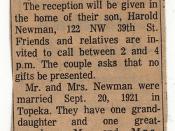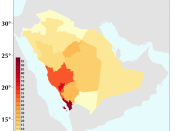Our world is made up of many cultures and societies. Each society has certain ethics and morals that they deem just and right. Some societies have very similar values, however what could be good in one society could be bad in another. We learn what is right and wrong from what surrounds us in the world. Growing up, it is in the immediate environment where children get scolded for doing something wrong and get taught the values of their society. I believe that values are then culturally constructed and are made by human beings and no other. When we sin or commit something that we feel guilty about and are afraid of the consequences, we feel guilty to no one else but to other human beings and ourselves.
The argument from Cardinal Newman's A Grammar of Assent claims that emotions that are within a person's conscience are directed to a supernatural being, a being not of this world "ÃÂGod.
I believe that this argument is inductively weak, which is when the premises provide weak evidence for the conclusion. Newman's premises cannot be proven or even lead to a high probability of the conclusion to be true.
The first premise states that: "If, as is the case, we feel responsibility, are ashamed, are frightened, at transgressing the voice of conscience, this implies that there is One to whom we are responsible, before whom we are ashamed, whose claims upon us we fear"ÃÂ (Newman) I agree with Newman that all humans feel a sense of responsibility, shame, and fear when disobeying their voice of conscience. However, I do not see how these feelings are to be owed to a higher being other than ourselves and other human beings. The prime reason to feeling all these emotions is that our society has classified things in the world to be right or wrong. When we feel ashamed of something we did, it is only because we have learned that what we did was wrong. But to know that what we did was wrong, we needed to learn from the values of our society the difference between good and bad. Therefore, the emotions derived from our conscience are there because of their implications in our society. For example, the penalty for stealing a loaf of bread in Saudi Arabia is to cut the person's hand off. In our society, stealing a loaf of bread would not even remotely result in such a penalty, and in addition, we would not feel nearly as ashamed or guilty for doing so as a person would in Saudi Arabia. Therefore, conscience has to be caused by society, rather than a cause of a higher being. When we do something wrong, we are afraid of what other human beings will do to us more than anything. A person who kills someone is afraid of getting caught by the police and a husband who cheats is afraid of being caught by his wife. All the acts that we know as wrong, we know because of society and learning from other people. I believe that God created the world and then left it up to us to make decisions as to what we do and how we structure the world.
Newman's second premise claims that "If the cause of these emotions does not belong to this visible world"æ"àThe cause of these emotions has to belong to society and human beings. The statement made above cannot be proved to be true because there is no way to prove that the emotions do not belong to this visible world. Therefore I will prove that they do. We, as human beings are very selfish people in that we are most afraid of something when it is directed toward us. I think that when societies first formed, the distinction between right and wrong was made on a personal level. When people first started to do bad things, those things were noted bad because they were unpleasant to the person they were being done to, which led to the creation of wrong and right, and then to conscience. A conscience is a part of a person reserved to emotions that occur after they have done something that is unpleasant to either themselves or to others. This does not imply that there is a higher being that we are afraid of attributing our conscience to because nothing proves that God created our morals and ethics.
Therefore, I cannot agree or believe in Newman's conclusion that "the Object to which [the conscientious person's] perception is directed must be Supernatural and Divine"æ"àI cannot find any concrete or probable evidence in his premises because I believe that the implication of our conscience is that we feel bad for what we have done to ourselves or other human beings in the visible world. I believe that since there is no evidence that God created our morals, it would be safe to assume that we should not feel responsible, ashamed, or frightened to him, rather we should direct those emotions towards others or ourselves in order to live a good, righteous life.
Works Cited: Newman, Cardinal. A Grammar of Assent.
Our world is made up of many cultures and societies. Each society has certain ethics and morals that they deem just and right. Some societies have very similar values, however what could be good in one society could be bad in another. We learn what is right and wrong from what surrounds us in the world. Growing up, it is in the immediate environment where children get scolded for doing something wrong and get taught the values of their society. I believe that values are then culturally constructed and are made by human beings and no other. When we sin or commit something that we feel guilty about and are afraid of the consequences, we feel guilty to no one else but to other human beings and ourselves.
The argument from Cardinal Newman's A Grammar of Assent claims that emotions that are within a person's conscience are directed to a supernatural being, a being not of this world "ÃÂGod. I believe that this argument is inductively weak, which is when the premises provide weak evidence for the conclusion. Newman's premises cannot be proven or even lead to a high probability of the conclusion to be true.
The first premise states that: "If, as is the case, we feel responsibility, are ashamed, are frightened, at transgressing the voice of conscience, this implies that there is One to whom we are responsible, before whom we are ashamed, whose claims upon us we fear"ÃÂ (Newman) I agree with Newman that all humans feel a sense of responsibility, shame, and fear when disobeying their voice of conscience. However, I do not see how these feelings are to be owed to a higher being other than ourselves and other human beings. The prime reason to feeling all these emotions is that our society has classified things in the world to be right or wrong. When we feel ashamed of something we did, it is only because we have learned that what we did was wrong. But to know that what we did was wrong, we needed to learn from the values of our society the difference between good and bad. Therefore, the emotions derived from our conscience are there because of their implications in our society. For example, the penalty for stealing a loaf of bread in Saudi Arabia is to cut the person's hand off. In our society, stealing a loaf of bread would not even remotely result in such a penalty, and in addition, we would not feel nearly as ashamed or guilty for doing so as a person would in Saudi Arabia. Therefore, conscience has to be caused by society, rather than a cause of a higher being. When we do something wrong, we are afraid of what other human beings will do to us more than anything. A person who kills someone is afraid of getting caught by the police and a husband who cheats is afraid of being caught by his wife. All the acts that we know as wrong, we know because of society and learning from other people. I believe that God created the world and then left it up to us to make decisions as to what we do and how we structure the world.
Newman's second premise claims that "If the cause of these emotions does not belong to this visible world"æ"àThe cause of these emotions has to belong to society and human beings. The statement made above cannot be proved to be true because there is no way to prove that the emotions do not belong to this visible world. Therefore I will prove that they do. We, as human beings are very selfish people in that we are most afraid of something when it is directed toward us. I think that when societies first formed, the distinction between right and wrong was made on a personal level. When people first started to do bad things, those things were noted bad because they were unpleasant to the person they were being done to, which led to the creation of wrong and right, and then to conscience. A conscience is a part of a person reserved to emotions that occur after they have done something that is unpleasant to either themselves or to others. This does not imply that there is a higher being that we are afraid of attributing our conscience to because nothing proves that God created our morals and ethics.
Therefore, I cannot agree or believe in Newman's conclusion that "the Object to which [the conscientious person's] perception is directed must be Supernatural and Divine"æ"àI cannot find any concrete or probable evidence in his premises because I believe that the implication of our conscience is that we feel bad for what we have done to ourselves or other human beings in the visible world. I believe that since there is no evidence that God created our morals, it would be safe to assume that we should not feel responsible, ashamed, or frightened to him, rather we should direct those emotions towards others or ourselves in order to live a good, righteous life.
Works Cited: Newman, Cardinal. A Grammar of Assent.
Our world is made up of many cultures and societies. Each society has certain ethics and morals that they deem just and right. Some societies have very similar values, however what could be good in one society could be bad in another. We learn what is right and wrong from what surrounds us in the world. Growing up, it is in the immediate environment where children get scolded for doing something wrong and get taught the values of their society. I believe that values are then culturally constructed and are made by human beings and no other. When we sin or commit something that we feel guilty about and are afraid of the consequences, we feel guilty to no one else but to other human beings and ourselves.
The argument from Cardinal Newman's A Grammar of Assent claims that emotions that are within a person's conscience are directed to a supernatural being, a being not of this world "ÃÂGod. I believe that this argument is inductively weak, which is when the premises provide weak evidence for the conclusion. Newman's premises cannot be proven or even lead to a high probability of the conclusion to be true.
The first premise states that: "If, as is the case, we feel responsibility, are ashamed, are frightened, at transgressing the voice of conscience, this implies that there is One to whom we are responsible, before whom we are ashamed, whose claims upon us we fear"ÃÂ (Newman) I agree with Newman that all humans feel a sense of responsibility, shame, and fear when disobeying their voice of conscience. However, I do not see how these feelings are to be owed to a higher being other than ourselves and other human beings. The prime reason to feeling all these emotions is that our society has classified things in the world to be right or wrong. When we feel ashamed of something we did, it is only because we have learned that what we did was wrong. But to know that what we did was wrong, we needed to learn from the values of our society the difference between good and bad. Therefore, the emotions derived from our conscience are there because of their implications in our society. For example, the penalty for stealing a loaf of bread in Saudi Arabia is to cut the person's hand off. In our society, stealing a loaf of bread would not even remotely result in such a penalty, and in addition, we would not feel nearly as ashamed or guilty for doing so as a person would in Saudi Arabia. Therefore, conscience has to be caused by society, rather than a cause of a higher being. When we do something wrong, we are afraid of what other human beings will do to us more than anything. A person who kills someone is afraid of getting caught by the police and a husband who cheats is afraid of being caught by his wife. All the acts that we know as wrong, we know because of society and learning from other people. I believe that God created the world and then left it up to us to make decisions as to what we do and how we structure the world.
Newman's second premise claims that "If the cause of these emotions does not belong to this visible world"æ"àThe cause of these emotions has to belong to society and human beings. The statement made above cannot be proved to be true because there is no way to prove that the emotions do not belong to this visible world. Therefore I will prove that they do. We, as human beings are very selfish people in that we are most afraid of something when it is directed toward us. I think that when societies first formed, the distinction between right and wrong was made on a personal level. When people first started to do bad things, those things were noted bad because they were unpleasant to the person they were being done to, which led to the creation of wrong and right, and then to conscience. A conscience is a part of a person reserved to emotions that occur after they have done something that is unpleasant to either themselves or to others. This does not imply that there is a higher being that we are afraid of attributing our conscience to because nothing proves that God created our morals and ethics.
Therefore, I cannot agree or believe in Newman's conclusion that "the Object to which [the conscientious person's] perception is directed must be Supernatural and Divine"æ"àI cannot find any concrete or probable evidence in his premises because I believe that the implication of our conscience is that we feel bad for what we have done to ourselves or other human beings in the visible world. I believe that since there is no evidence that God created our morals, it would be safe to assume that we should not feel responsible, ashamed, or frightened to him, rather we should direct those emotions towards others or ourselves in order to live a good, righteous life.
Works Cited: Newman, Cardinal. A Grammar of Assent.
Our world is made up of many cultures and societies. Each society has certain ethics and morals that they deem just and right. Some societies have very similar values, however what could be good in one society could be bad in another. We learn what is right and wrong from what surrounds us in the world. Growing up, it is in the immediate environment where children get scolded for doing something wrong and get taught the values of their society. I believe that values are then culturally constructed and are made by human beings and no other. When we sin or commit something that we feel guilty about and are afraid of the consequences, we feel guilty to no one else but to other human beings and ourselves.
The argument from Cardinal Newman's A Grammar of Assent claims that emotions that are within a person's conscience are directed to a supernatural being, a being not of this world "ÃÂGod. I believe that this argument is inductively weak, which is when the premises provide weak evidence for the conclusion. Newman's premises cannot be proven or even lead to a high probability of the conclusion to be true.
The first premise states that: "If, as is the case, we feel responsibility, are ashamed, are frightened, at transgressing the voice of conscience, this implies that there is One to whom we are responsible, before whom we are ashamed, whose claims upon us we fear"ÃÂ (Newman) I agree with Newman that all humans feel a sense of responsibility, shame, and fear when disobeying their voice of conscience. However, I do not see how these feelings are to be owed to a higher being other than ourselves and other human beings. The prime reason to feeling all these emotions is that our society has classified things in the world to be right or wrong. When we feel ashamed of something we did, it is only because we have learned that what we did was wrong. But to know that what we did was wrong, we needed to learn from the values of our society the difference between good and bad. Therefore, the emotions derived from our conscience are there because of their implications in our society. For example, the penalty for stealing a loaf of bread in Saudi Arabia is to cut the person's hand off. In our society, stealing a loaf of bread would not even remotely result in such a penalty, and in addition, we would not feel nearly as ashamed or guilty for doing so as a person would in Saudi Arabia. Therefore, conscience has to be caused by society, rather than a cause of a higher being. When we do something wrong, we are afraid of what other human beings will do to us more than anything. A person who kills someone is afraid of getting caught by the police and a husband who cheats is afraid of being caught by his wife. All the acts that we know as wrong, we know because of society and learning from other people. I believe that God created the world and then left it up to us to make decisions as to what we do and how we structure the world.
Newman's second premise claims that "If the cause of these emotions does not belong to this visible world"æ"àThe cause of these emotions has to belong to society and human beings. The statement made above cannot be proved to be true because there is no way to prove that the emotions do not belong to this visible world. Therefore I will prove that they do. We, as human beings are very selfish people in that we are most afraid of something when it is directed toward us. I think that when societies first formed, the distinction between right and wrong was made on a personal level. When people first started to do bad things, those things were noted bad because they were unpleasant to the person they were being done to, which led to the creation of wrong and right, and then to conscience. A conscience is a part of a person reserved to emotions that occur after they have done something that is unpleasant to either themselves or to others. This does not imply that there is a higher being that we are afraid of attributing our conscience to because nothing proves that God created our morals and ethics.
Therefore, I cannot agree or believe in Newman's conclusion that "the Object to which [the conscientious person's] perception is directed must be Supernatural and Divine"æ"àI cannot find any concrete or probable evidence in his premises because I believe that the implication of our conscience is that we feel bad for what we have done to ourselves or other human beings in the visible world. I believe that since there is no evidence that God created our morals, it would be safe to assume that we should not feel responsible, ashamed, or frightened to him, rather we should direct those emotions towards others or ourselves in order to live a good, righteous life.
Works Cited: Newman, Cardinal. A Grammar of Assent.
The Voice Within Our world is made up of many cultures and societies. Each society has certain ethics and morals that they deem just and right. Some societies have very similar values, however what could be good in one society could be bad in another. We learn what is right and wrong from what surrounds us in the world. Growing up, it is in the immediate environment where children get scolded for doing something wrong and get taught the values of their society. I believe that values are then culturally constructed and are made by human beings and no other. When we sin or commit something that we feel guilty about and are afraid of the consequences, we feel guilty to no one else but to other human beings and ourselves.
The argument from Cardinal Newman's A Grammar of Assent claims that emotions that are within a person's conscience are directed to a supernatural being, a being not of this world "ÃÂGod. I believe that this argument is inductively weak, which is when the premises provide weak evidence for the conclusion. Newman's premises cannot be proven or even lead to a high probability of the conclusion to be true.
The first premise states that: "If, as is the case, we feel responsibility, are ashamed, are frightened, at transgressing the voice of conscience, this implies that there is One to whom we are responsible, before whom we are ashamed, whose claims upon us we fear"ÃÂ (Newman) I agree with Newman that all humans feel a sense of responsibility, shame, and fear when disobeying their voice of conscience. However, I do not see how these feelings are to be owed to a higher being other than ourselves and other human beings. The prime reason to feeling all these emotions is that our society has classified things in the world to be right or wrong. When we feel ashamed of something we did, it is only because we have learned that what we did was wrong. But to know that what we did was wrong, we needed to learn from the values of our society the difference between good and bad. Therefore, the emotions derived from our conscience are there because of their implications in our society. For example, the penalty for stealing a loaf of bread in Saudi Arabia is to cut the person's hand off. In our society, stealing a loaf of bread would not even remotely result in such a penalty, and in addition, we would not feel nearly as ashamed or guilty for doing so as a person would in Saudi Arabia. Therefore, conscience has to be caused by society, rather than a cause of a higher being. When we do something wrong, we are afraid of what other human beings will do to us more than anything. A person who kills someone is afraid of getting caught by the police and a husband who cheats is afraid of being caught by his wife. All the acts that we know as wrong, we know because of society and learning from other people. I believe that God created the world and then left it up to us to make decisions as to what we do and how we structure the world.
Newman's second premise claims that "If the cause of these emotions does not belong to this visible world"æ"àThe cause of these emotions has to belong to society and human beings. The statement made above cannot be proved to be true because there is no way to prove that the emotions do not belong to this visible world. Therefore I will prove that they do. We, as human beings are very selfish people in that we are most afraid of something when it is directed toward us. I think that when societies first formed, the distinction between right and wrong was made on a personal level. When people first started to do bad things, those things were noted bad because they were unpleasant to the person they were being done to, which led to the creation of wrong and right, and then to conscience. A conscience is a part of a person reserved to emotions that occur after they have done something that is unpleasant to either themselves or to others. This does not imply that there is a higher being that we are afraid of attributing our conscience to because nothing proves that God created our morals and ethics.
Therefore, I cannot agree or believe in Newman's conclusion that "the Object to which [the conscientious person's] perception is directed must be Supernatural and Divine"æ"àI cannot find any concrete or probable evidence in his premises because I believe that the implication of our conscience is that we feel bad for what we have done to ourselves or other human beings in the visible world. I believe that since there is no evidence that God created our morals, it would be safe to assume that we should not feel responsible, ashamed, or frightened to him, rather we should direct those emotions towards others or ourselves in order to live a good, righteous life.
Works Cited: Newman, Cardinal. A Grammar of Assent.
hey





